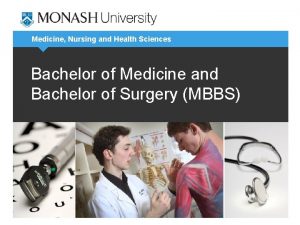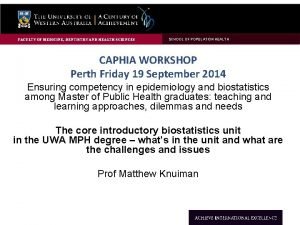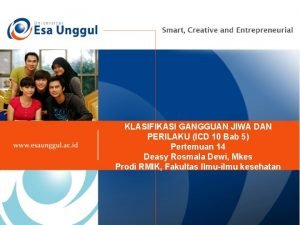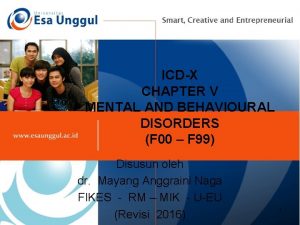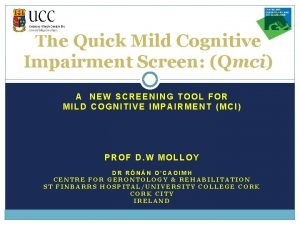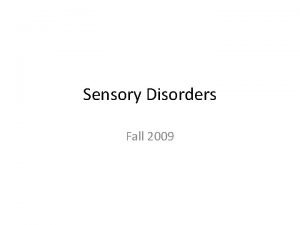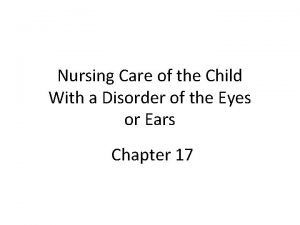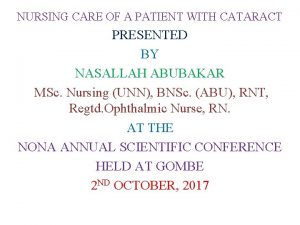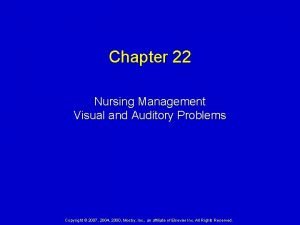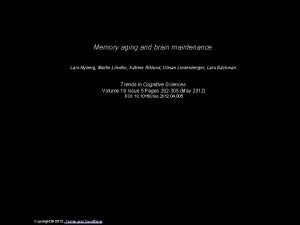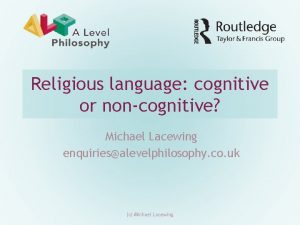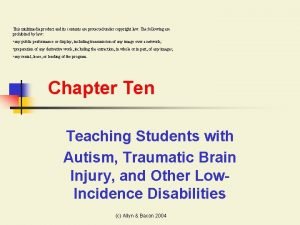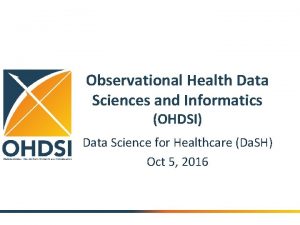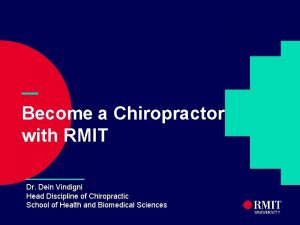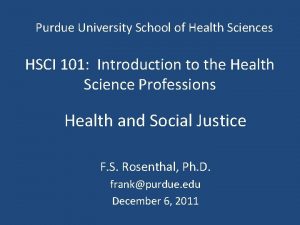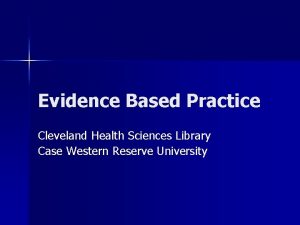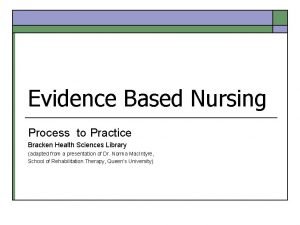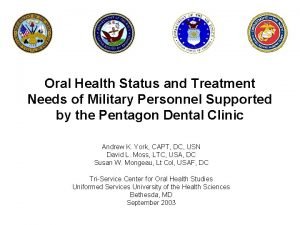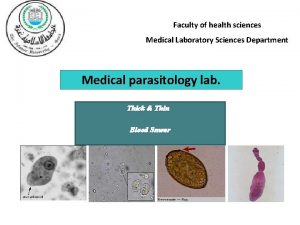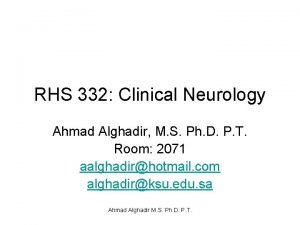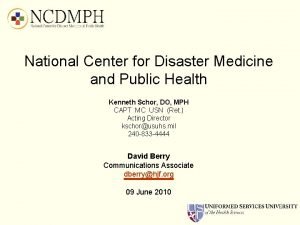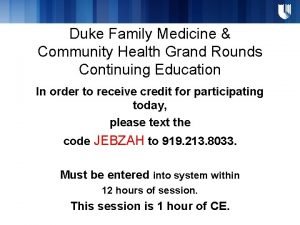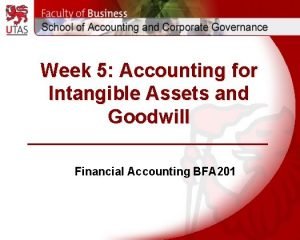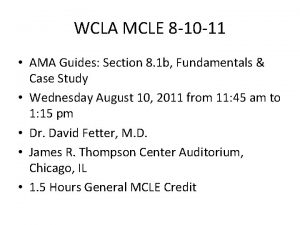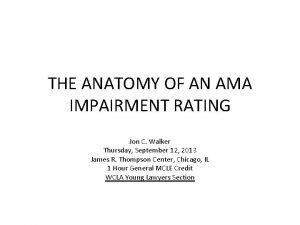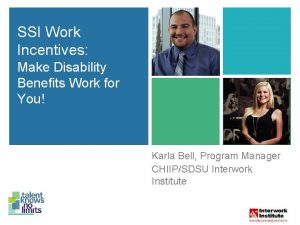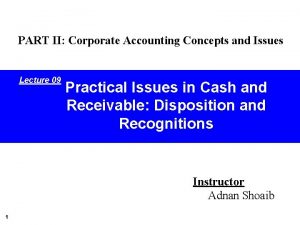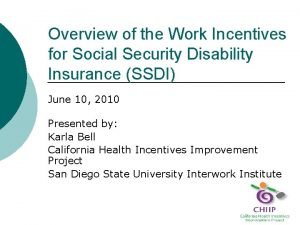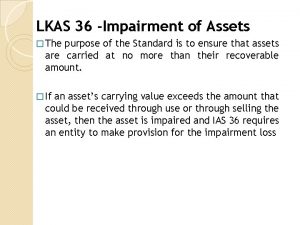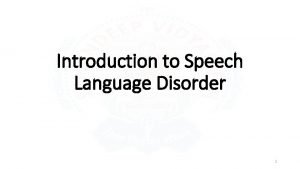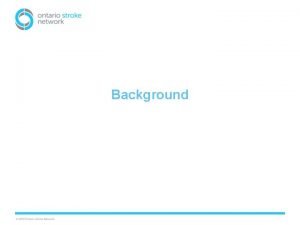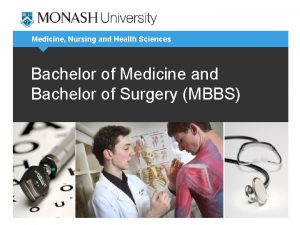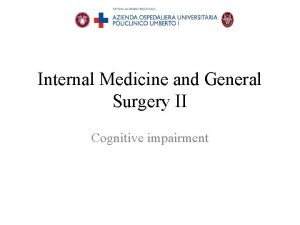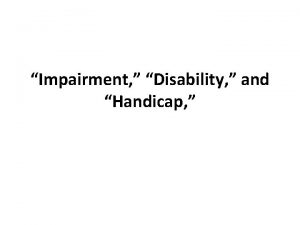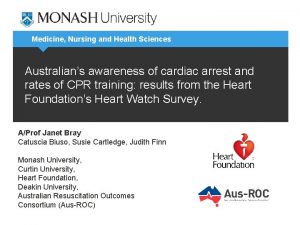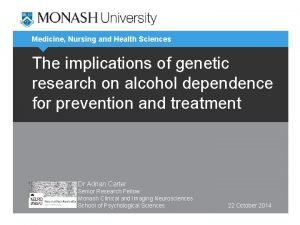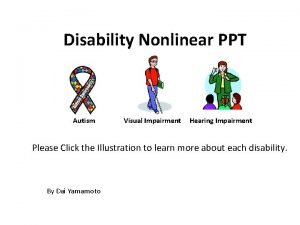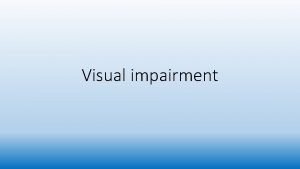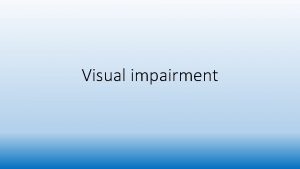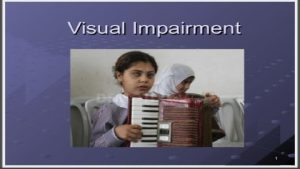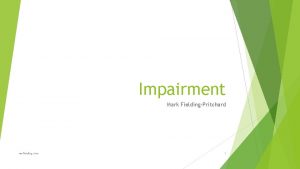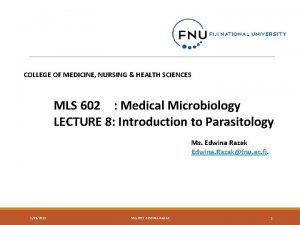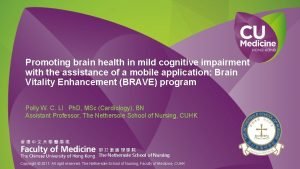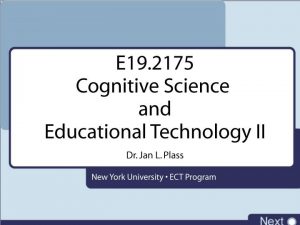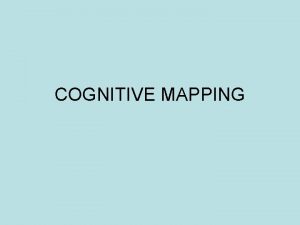Medicine Nursing and Health Sciences Cognitive impairment and












































- Slides: 44

Medicine, Nursing and Health Sciences Cognitive impairment and cognitive recovery in substance related disorders A/Prof. Antonio Verdejo-Garcia Catania, July 2015

Outline 1. Cognition -- What is it (for)? 2. Subtyping/Matching 3. Prediction 4. Cognitive remediation Cognition and Outcomes 2

Updating and management OF input-independent info FOR goal-achievement and decision-making Cognition and Outcomes 3

3 D 5 B 1 H/ 135 BDH RED GREEN BLUE D RED GREEN BLUE X D Cognition and Outcomes 4

Moreno-López et al. (2012) Cognition and Outcomes 5

Gray Matter Moreno-López et al. (2012) White Matter 6

Factor Analysis of Executive Functions Components Measures Factor Load h 2 Updating Letter Number Sequencing 0. 5 -0. 8 0. 53 -0. 73 Inhibition Stroop 0. 7 -0. 8 0. 51 -0. 63 Switching Wisconsin Card Sorting Test 0. 5 -0. 9 0. 45 -0. 74 Decision-making Iowa Gambling Task 0. 9 0. 83 Verdejo-García & Perez-Garcia (2007)

Stimulants vs Opiate users Verdejo-García & Perez-Garcia (2007)

Components Prevalence Rate Drug of choice w/greater deficits Working memory 62. 2 % C=H Response Inhibition 38. 3 % C>H Shifting 27. 3 % C>H Global Impairment 68. 8 % Cognition and Outcomes 9

Focus of current interventions (MI or CBT) § Life goals § Self-control and self-monitoring § Avoid risk Cognition and Outcomes 10

Focus of current interventions (MI or CBT) g § Life goals n i rk ng o § Self-control and self-monitoringred w aki m i a n p o i m s i § Avoid risk i c s n e e e t e or d i s w i t u e q n b e o r i h t t i c t n b i a e h m , in m t s i a e M ory r t m and e m Cognition and Outcomes 11

What cognition may add… § Subtyping/Matching § Prediction § Focused interventions Neuropsychological Assessment Cognitive Rehabilitation Cognition and Outcomes 12

Albein-Urios et al. (2013, 2014) Cognition and Outcomes 13

LCA of trait and cognitive impulsivity scores in 96 addiction clients 10 9 Inatentive/Impulsive Cluster 8 Non-Impulsive Cluster 7 6 5 4 3 2 1 Albein-Urios et al. (2014) 0 Somatic (0 - Anxiety (0 - Depression. Social Dysf Craving (0 - Qo. L (0 -10) 3) 3) (0 -3) 10) Cognition and Outcomes 14

6 Non-Comorbid 5 Cluster B Cluster C Z scores 4 3 2 1 0 Working Memory Attention/ Inhibition Shifting Composite Albein-Urios et al. (2013) Cognition and Outcomes 15

6 Non-Comorbid 5 Cluster B Cluster C Z scores 4 3 2 1 0 Working Memory Attention/ Inhibition Shifting Composite Albein-Urios et al. (2013) Cognition and Outcomes 16

6 Non-Comorbid 5 Cluster B Cluster C Z scores 4 3 2 1 0 Working Memory Attention/ Inhibition Shifting Composite Albein-Urios et al. (2013) Cognition and Outcomes 17

6 Non-Comorbid 5 Cluster B Cluster C Z scores 4 3 2 1 0 Working Memory Attention/ Inhibition Shifting Composite Albein-Urios et al. (2013) Cognition and Outcomes 18

Medicine, Nursing and Health Sciences Prediction of at risk clients

Key cognitive processes § Delay Discounting § Decision-making Cognition and Outcomes 20

Delay discounting Marshmallows! http: //www. youtube. com/watch? v=QX_oy 9614 HQ Peters and Buchel (2011) TICS: 11(5) Presentation title 28 th February 2011 21

Christakou et al. (2011) 22

Delay discounting in addiction Albein-Urios et al. (2014) Presentation title 23

Delay Discounting longitudinally predicts who stay in treatment Stevens, Verdejo-Garcia et al. (2014) Cognition and Outcomes 24

Treatment readiness correlate with brain fitness Moreno-Lopez et al. (2014) Cognition and Outcomes 28 th February 2011 25

Decision-making Bechara et al. (2005)

Bechara et al. (2005)

Decision-making in addiction Verdejo-Garcia et al. (2007) 28

Association with severity of cocaine use Verdejo-Garcia et al. (2007) 29

Using the Iowa Gambling Task to predict relapse § Baseline assessments (~2 weeks after treatment commencement) and classification: § Insensitivity to future consequences § Hypersensitivity to reward § Intact § Follow-up – 3 months after baseline assessments, to provide a 3 cm hair sample to assess drug relapse. Verdejo-Garcia et al. (2014) Cognition and Outcomes 30

Outcome: Cocaine hair concentrations 3 months after treatment onset Verdejo-Garcia et al. 2014 31

Outcome: Cocaine hair concentrations 3 months after treatment onset Verdejo-Garcia et al. 2014 32

Medicine, Nursing and Health Sciences Cognitive enhancement interventions ✔ Cognition Amenable to Interventions ✔ ? Clinical Outcomes

Presentation title 28 th February 2011 34

Wiers and colleagues

Wiers and colleagues


Ø Cognitive training of skills needed to: ü Set personal goals – tailored (“mental blackboard”) ü Resist interference (“automatic pilot”) v Boredom v Stress v Habits ü Quality control – from external to self-generated feedback Ø Practice when and how utilise them in daily life

GMT Automatic pilot STOP! Present Mindedness Back to Goal A B State your Decision Quality control! C D Alfonso et al. (2011)

MFN Automatic pilot STOP! Present Mindedness Meditation motives (e. g. , endurance, willpower) A B Interoceptive scanning Decisionmaking When distracted Back to motive C D Alfonso et al. (2011)

Goal Management Training Long-term goals Decision-making in the Iowa Gambling Task * * STOP! Alfonso et al. (2011)

Conclusions § Most substance dependent clients have executive thinking deficits § Deficient skills are paradoxically prerequisites of addiction treatments we currently apply § There is potential to recovery, and cognitive training can improve treatment outcomes Cognition and Outcomes TP Nov 2013 42

Acknowledgements § Funding – Monash Strategic Grant Scheme – Red de Trastornos Adictivos, Universidad de Granada § Turning Point Drug and Alcohol Centre – Dan Lubman – Victoria Manning § Verdejo-Garcia’s group: – – – MJ Fernandez-Serrano Laura Moreno-Lopez Jose M Martinez-Gonzalez Jose C Perales Oscar Lozano Natalia Albein 43

Thank you! 44
 Faculty of medicine nursing and health sciences
Faculty of medicine nursing and health sciences Pubh4401
Pubh4401 Gaduh gelisah icd 10
Gaduh gelisah icd 10 Kode icd 10 mata kedutan
Kode icd 10 mata kedutan Quick mild cognitive impairment screen
Quick mild cognitive impairment screen Ucf health sciences health promotion track
Ucf health sciences health promotion track Natural science tok
Natural science tok Nursing diagnosis for vision impairment
Nursing diagnosis for vision impairment Hirschberg test
Hirschberg test Postoperative nursing diagnosis of cataract
Postoperative nursing diagnosis of cataract Abcdefg assessment
Abcdefg assessment Nursing diagnosis for meniere's disease
Nursing diagnosis for meniere's disease Memory aging and brain maintenance
Memory aging and brain maintenance Cognitive and non cognitive religious language
Cognitive and non cognitive religious language Other health impairment definition
Other health impairment definition Observational health data sciences and informatics
Observational health data sciences and informatics Dein vindigni
Dein vindigni Health and environmental sciences institute
Health and environmental sciences institute Kavneet hayre
Kavneet hayre Purdue health sciences
Purdue health sciences Cleveland health sciences library
Cleveland health sciences library University of health sciences lahore events
University of health sciences lahore events Bracken health sciences library
Bracken health sciences library Drexel hahnemann library
Drexel hahnemann library Uniformed services university of the health sciences
Uniformed services university of the health sciences Shimberg library
Shimberg library Ucsf global health sciences
Ucsf global health sciences Kafue institute of health sciences
Kafue institute of health sciences Kafue institute of health sciences
Kafue institute of health sciences Facultad de ciencias de la salud uma
Facultad de ciencias de la salud uma Impairment vs disability
Impairment vs disability Accommodations for speech and language impairment
Accommodations for speech and language impairment Component depreciation
Component depreciation Difference between impairment disability and handicap
Difference between impairment disability and handicap School of public health monash
School of public health monash National center for disaster medicine and public health
National center for disaster medicine and public health Duke medicine grand rounds
Duke medicine grand rounds Aasb 138 intangible assets
Aasb 138 intangible assets Ama impairment rating chart
Ama impairment rating chart Ama impairment rating chart
Ama impairment rating chart Impairment related work expenses
Impairment related work expenses Impairment loss on receivables
Impairment loss on receivables Impairment related work expenses
Impairment related work expenses Lkas 36
Lkas 36 What causes speech impediment
What causes speech impediment
